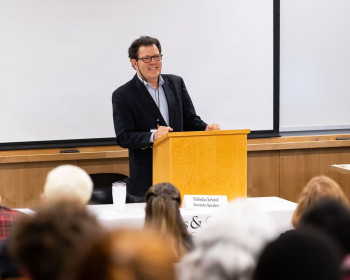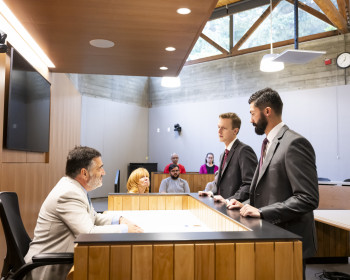Managing Debt as a Public Interest Law Student
Lewis & Clark Law has a wide variety of resources to help public interest-minded students
Open gallery

Pursuing a career in public-interest can appear daunting at first glance because of the generally lower salaries paid to public interest lawyers. However, Lewis & Clark has a wide array of resources and programs to support public interest students every step of the way. Lewis & Clark Law’s financial program supports students before, during, and after their time at the law school. This support can take the form of scholarships, work opportunities, fellowships, and loan forgiveness programs.
Students are supported through work opportunities at Lewis & Clark that include externships, clinics, and federal work study positions. Lewis & Clark also has a Pro Bono & Community Service Program, as well as a Public Interest Certificate that students can earn during their time at the law school.
Lewis & Clark awards scholarships to a significant percentage of each year’s entering class and to upper-division students. Over 98.9% of all incoming students receive a scholarship or grant, and all scholarships for incoming students are given unconditionally. Students do not need to maintain a certain GPA or class rank for their scholarship to renew annually. There are also merit based scholarships and donor supported scholarships for incoming and upper division students, eight of which are directed solely to public interest students.
During students’ time at Lewis & Clark, many participate in experiential legal learning through externships, clinics, and federal work study positions. Externships provide students the opportunity to earn academic credit in exchange for a supervised work experience beyond classroom walls during summer break. Additionally, some students receive paid experiential work through federal work study programs, which are available to second and third year students and provide students an opportunity to be a federally funded law clerk.
Lewis & Clark also provides funds for public-interest law students through the Lezak Social Justice Fellowship and Public Interest Law Project (PILP) awards. Four to six students are selected as Lezak Fellows each year. These students work in public interest law and often would not be able to pursue public interest positions without Lezak support. Lezak students are granted summer stipends that allow them to provide direct assistance to underserved clients and causes. PILP is a student-run organization that was founded in 1990 to help fill the justice gap between those who need attorneys and those who can afford attorneys. Since 1990, PILP has granted summer awards to 383 students. Annually PILP provides summer stipends for ten or more law students who are working in unpaid public interest externships or jobs over their law school summers.
Lewis & Clark’s support for public-interest students does not stop after graduation. The school has a robust Loan Repayment Assistance Program (LRAP) that is in part funded by its students.
Each law student pays $25 a semester to help support the LRAP program and donors also contribute to the fund. Recent alumni who are using their Lewis & Clark law degree to help under-represented people or causes at a government, nonprofit, or tribal office with a yearly salary at or below $65,000 (or $70,000 in some specified cities) may qualify for LRAP Assistance. Applicants who qualify can receive money to assist them pay off loans. LRAP awards are structured as loans, which are forgiven without repayment when the recipient shows completion of a year of qualified public interest employment.
Finally, the law school’s career services division has a robust program to support students in finding public interest jobs. In fact, according to the 2021 ABA required disclosures from law schools throughout the nation, Lewis & Clark Law School ranked third in the nation for public service employment.
Lewis & Clark’s commitment to public interest law has allowed countless students to work for the communities that need them.
Law Communications is located in room 304 of Legal Research Center (LRC) on the law Campus.
MSC: 51
email jasbury@lclark.edu
voice 503-768-6605
Cell: 626-676-7923
Assistant Dean,
Communications and External Relations, Law School
Judy Asbury
Law Communications
Lewis & Clark Law School
10101 S. Terwilliger Boulevard MSC 51
Portland OR 97219

